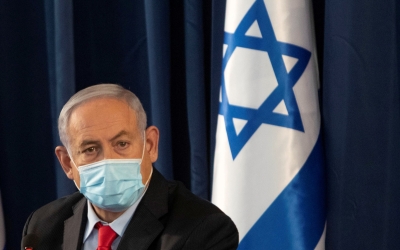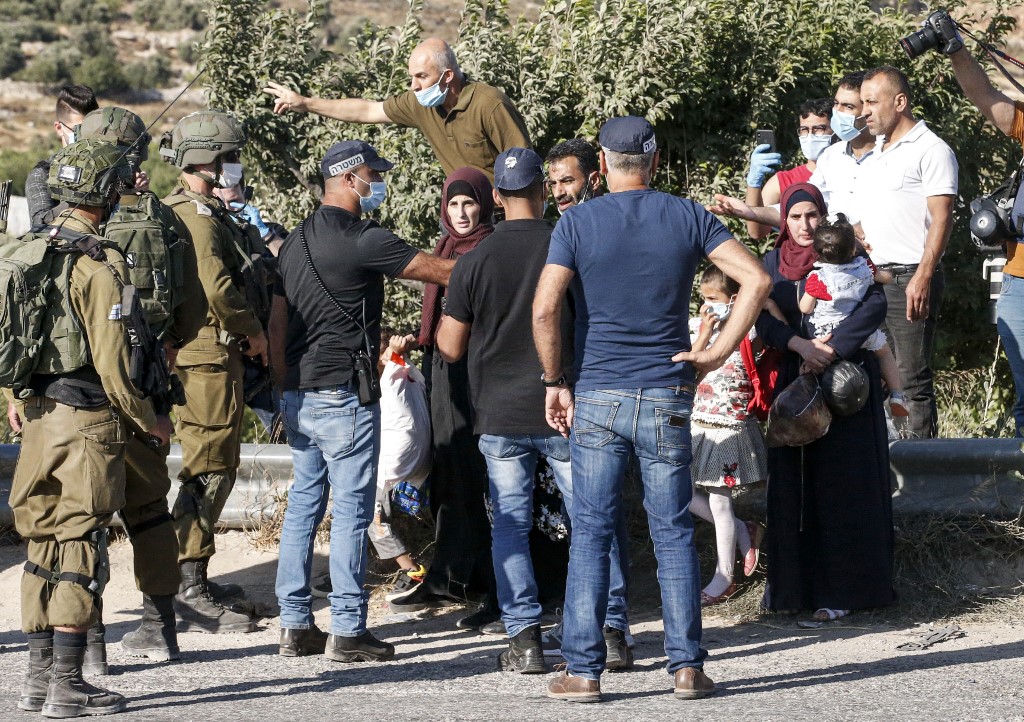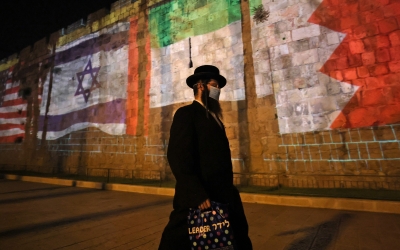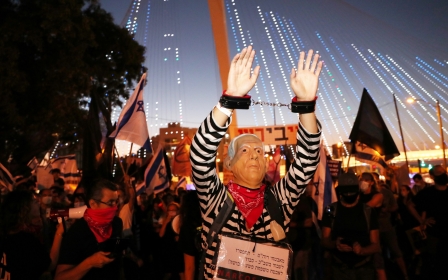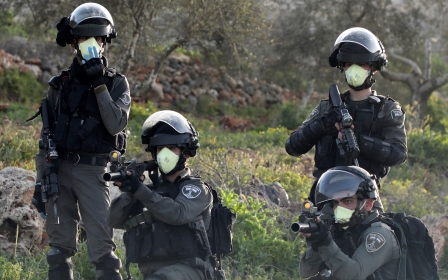Coronavirus: Israel turns to army as pandemic clampdown intensifies
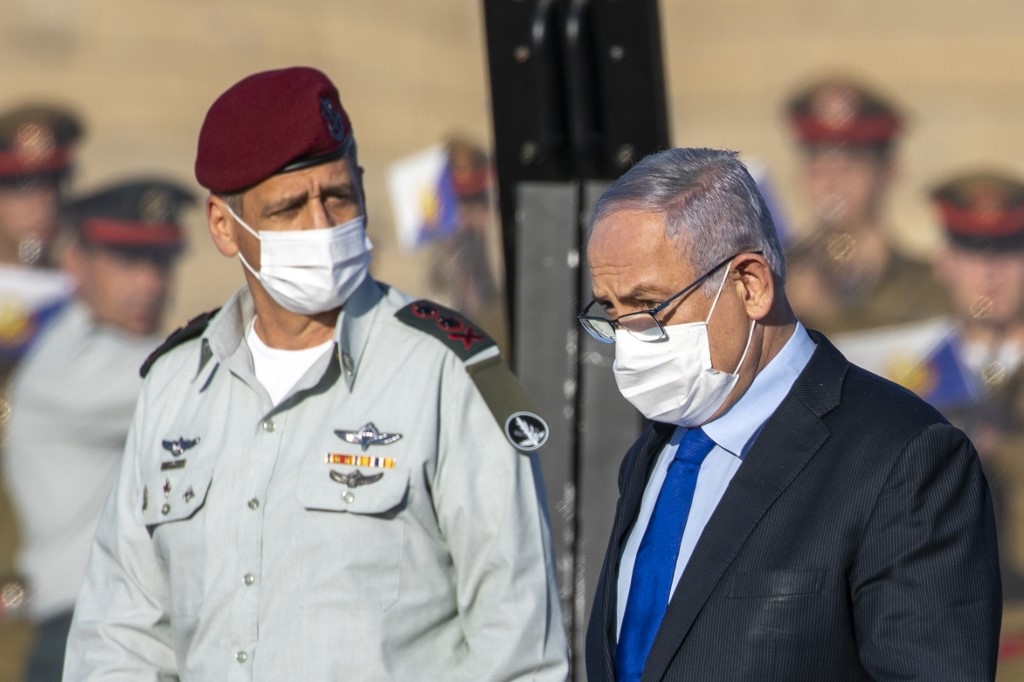
"Let the IDF win," is an old Israeli slogan coined by the right-wing leadership during the Second Intifada (2000-2005).
It meant do not let the cowardly politicians, the Palestinian-loving left, the biased courts and hostile media interfere with the performance of the army - just let them do whatever they need to win.
About 20 years later, this slogan has undergone an intriguing adjustment. It now says: "Let the IDF win Covid-19."
The subtext: since nobody else has a clue, certainly not politicians or other civil institutions in charge, let the Israeli army take over the handling of the pandemic. They have the expertise, the technology and, most importantly, they are not the 120 members of the Israeli parliament, who are each burdened with their own agenda.
In a public opinion survey published by Channel 12 in July, 57 percent of respondents supported the position of Minister of Defence Benny Gantz, who claimed the coronavirus "operation must be transferred to the [Israeli army's] Home Front Command and the Ministry of Defence". Only 20 percent opposed this notion.
Gantz wasn't the first to usher that call. His predecessor as defence minister, Naftali Bennett, and many other high-ranking reserve officers, said the same. But at that time, Prime Minister Benjamin Netanyahu was reluctant to hand over the management of the crisis to his arch-rival.
But Covid-19 had different plans. In a 13 April interview, an unnamed senior security officer told Amos Harel, Haaretz newspaper's leading expert on military affairs, that the "Israeli army can't solve the coronavirus crisis". The liberal daily itself warned against military intervention in the civil crisis.
Let the army save us
Fast-forward five months later, and Harel openly called upon military chief of staff Aviv Kochavi this week to "rise to the challenge as Israel faces a rampant coronavirus outbreak".
The change is mainly a reflection of total despair and loss of trust in the dysfunctional Netanyahu government.
These findings are hardly surprising considering the monumental failure of the government in handling the crisis. According to all polls, most Israelis have lost trust in how the government is dealing with the pandemic, a far cry from the overwhelming satisfaction with government performance in the first March-April wave of the virus.
A growing number of Israelis believe Netanyahu's personal and political interests - most prominently the charges of fraud and bribery hanging over him - are his primary motivation in his handling of the crisis
A growing number of Israelis believe Netanyahu's personal and political interests - most prominently the charges of fraud and bribery hanging over him - are his primary motivation in his handling of the crisis, while other ministers of the cabinet just seem totally incompetent.
The prevailing sentiment is that Israeli citizens have been abandoned by a detached leadership more preoccupied with saving their jobs or grand, irrelevant gestures like the "peace agreement" with the UAE and Bahrain, marketed by Netanyahu himself mainly as a touristic bonanza.
The army, which still enjoys a high level of public trust, seems to be the natural saviour. Particularly so when the health crisis has been framed in blunt military jargon. The pandemic is a "war," coronavirus is an "enemy" and all citizens are mobilised to fight an uphill battle their leadership keeps losing day after day.
"I am deeply disturbed by the military jargon imposed on us all concerning this damn coronavirus," Rana Abu Fraiha, an award-winning Israeli-Palestinian film director, wrote on her Facebook page.
Words of war
Even the failure to manage this crisis is painted in martial colours. In a TV interview, retired general and former head of the army's military intelligence directorate Amos Yadlin compared the pandemic to the traumatic experience of the 1973 Arab-Israeli war.
In 1973 too, it was the arrogant, self-absorbed government that was viewed as bringing on disaster while the Israeli army rescued the nation. This narrative resonates with Israelis, despite one huge difference: unlike war, a health crisis is a civilian issue. The danger, as far as military intervention is concerned, is blurring this distinction.
'The legitimisation of the securitisation of health may easily lead to legitimisation of use of irregular methods and easy acceptance of infringement on civil rights'
- Yagil Levy, sociology professor
The use of military jargon in the context of Covid-19 and the limited mobilisation of the military is not unique to Israel. It is happening in the United States and other coronavirus-stricken countries as well. But in Israel, where the presence of the military in the public sphere is an everyday reality, putting soldiers in charge of the lives of civilians has a long history.
For over 50 years, Israelis have dictated the lives of Palestinians under military occupation. The establishment of the separation wall between Israel and the occupied West Bank even gave birth to a new military title - "coordinator of daily life" - an officer in charge of providing solutions to the difficulties faced by Palestinians living near the wall, like accessing their lands. Being overseen by a "coordinator of daily life" amid the coronavirus crisis might then feel quite normal to Israelis.
The army and security forces are everywhere and play a major role in the management of the pandemic.
Home Front Command established coronavirus hotels for the mildly sick and manages nursing homes; the secret service has the licence to track mobile phones to detect contagious cases; Mossad was mobilised to locate and supply medical equipment; battalions were deployed in ultra-Orthodox majority cities to help the population - just to name a few.
Talking to MEE, Professor Yagil Levy, expert on civil-military relations at the Open University of Israel's department of sociology, defines this unique situation as the "securitisation of the coronavirus crisis in Israel".
"The framing of the epidemic as a security issue began to develop when the management of the crisis was handed over [by Netanyahu] to the National Security Council," he says.
"It makes sense in a country where the security establishment remains powerful, and it is actually tempting since the IDF is perceived as competent and free of political bias.
"Still, the legitimisation of the securitisation of health may easily lead to legitimisation of use of irregular methods and easy acceptance of infringement on civil rights," Levy added.
This shift comes at a time when Netanyahu and his entourage are successfully engaged in an assault on all institutions of Israeli democracy.
The lengthy parliamentary debate over the newly tightened lockdown gave hardly any time to discuss its impact on Israeli society. Instead, long hours were devoted to finding means to curb weekly mass demonstrations in front of Netanyahu's residence.
Lockdown or clampdown?
It feels as if the real intention of the renewed stifling lockdown is not to cut the chain of infection but rather the chain of demonstrations.
It is especially problematic as Israel is today in the midst of a constitutional crisis where old emergency regulations that have not been revoked since 1948 leave room for a dictatorship style of rule. In this climate, there is no public debate over the imminent dangers of crossing the line between a constructive military support system and a full military takeover.
Public debate is a mission impossible in a deeply divided society preoccupied with personal survival. Israeli society is now paying the price for a decade of intentionally divisive domestic policy and erosion of a basic sense of solidarity.
In the absence of public debate over the dividing line between the civil and military sphere, the Institute for National Security Studies and Israeli Democracy Institute published a series of articles under the title "Society-military relations under coronavirus: insights from the first wave".
In a paper under this headline, political scientist Stuart Cohen poses the question: "Military intervention and coronavirus: is it really a slippery slope?"
Cohen refers to a concern expressed by Professor Eviatar Matania, founder and former head of the Israel National Cyber Directorate, who warned against handing over the management of the crisis to an essentially non-democratic body like the army.
Cohen claims that the concerns are exaggerated, and all defence forces are there to assist and not to take over.
His insight derived from the relatively well-handled first wave of the pandemic. Under those circumstances, even those who raised cautious questions claimed that handing over the management of the crisis to the military was acceptable only under exceptional circumstances and the imminent collapse of the civil system.
Yet as the number of cases in Israel spike and understaffed hospitals declare a state of emergency, the army is now preparing to step up as the institution of last resort in this national crisis.
In the absence of democratic checks and balances, with political leaders for whom democracy is just an obstacle, danger is just around the corner.
Middle East Eye delivers independent and unrivalled coverage and analysis of the Middle East, North Africa and beyond. To learn more about republishing this content and the associated fees, please fill out this form. More about MEE can be found here.


